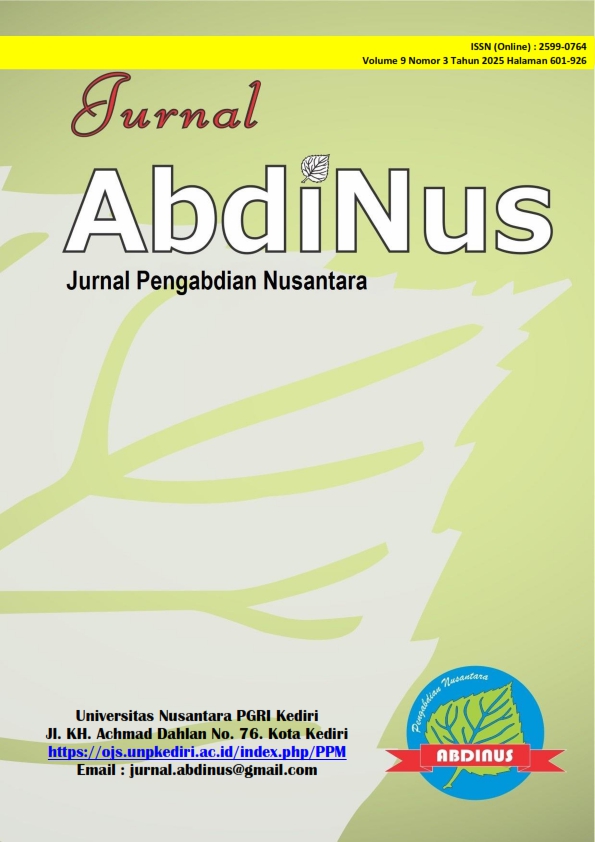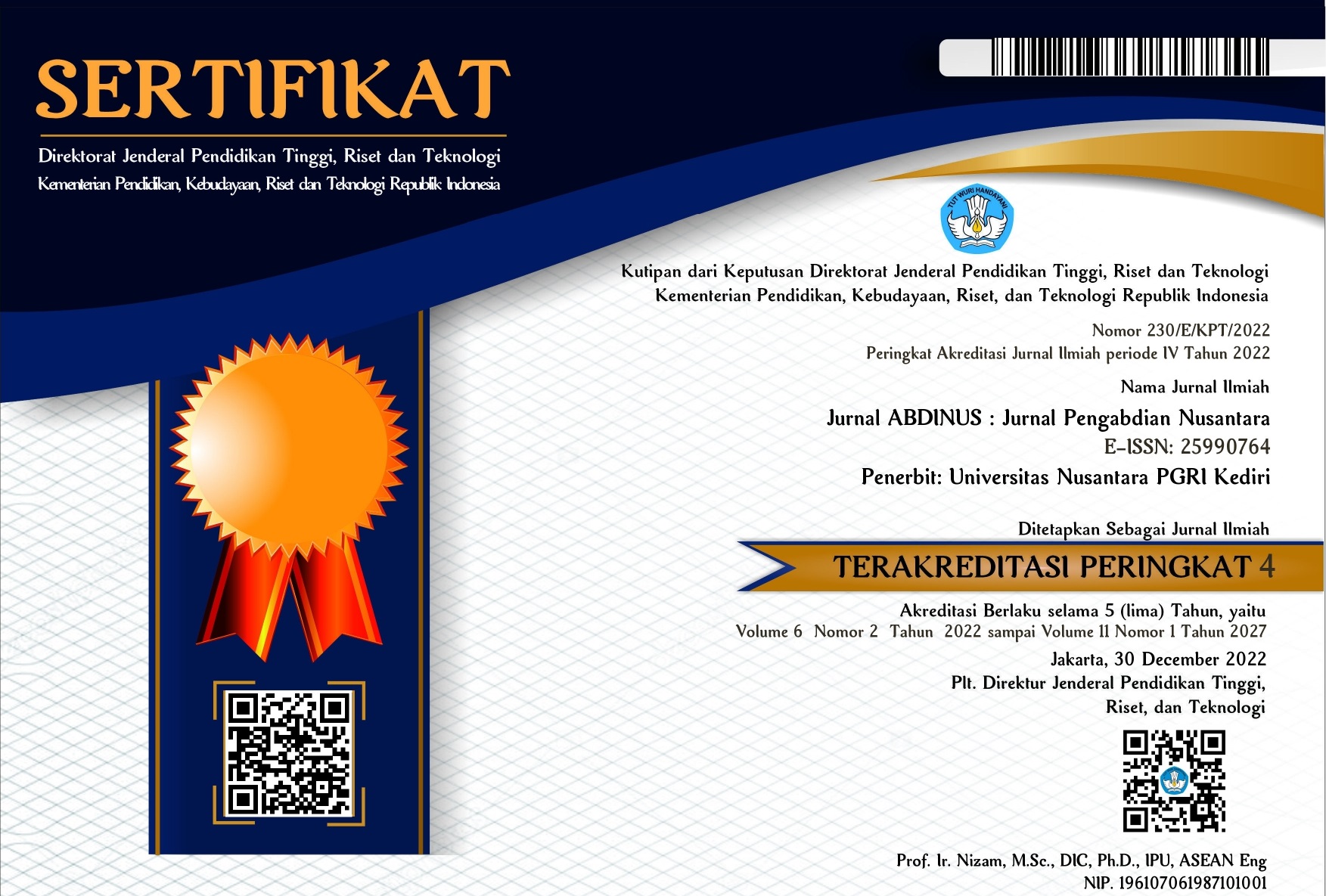Peningkatan Kompetensi Guru dalam Pengembangan Modul Ajar Kurikulum Merdeka Berbasis Project Based Learning Melalui Pemanfaatan Artificial Intelligence di SD Laboratorium UM Kota Malang
DOI:
https://doi.org/10.29407/ja.v9i3.27037Keywords:
Artificial Intelligence, Project-Based Learning, Kurikulum Merdeka, Teacher Training, Educational Innovation.Abstract
The rapid advancement of the Fourth Industrial Revolution has introduced significant challenges in the educational sector, particularly in integrating Artificial Intelligence (AI) into teaching and learning processes. This community service program aimed to enhance the competencies of teachers at SD Laboratorium Universitas Negeri Malang (UM) in developing teaching modules based on Project-Based Learning (PjBL) integrated with AI tools, aligning with the principles of the Kurikulum Merdeka. The program encompassed a needs assessment, coordination with school leadership, preparation of training materials, and the implementation of direct training sessions focusing on the use of AI tools such as ChatGPT, Magic School, and Jenni AI in designing PjBL modules. Evaluation through questionnaires indicated a significant improvement in teachers' understanding and ability to integrate AI into their teaching modules. As a result, teachers successfully developed comprehensive PjBL-based teaching modules incorporating AI, which are expected to enhance the quality of education and foster 21st-century skills among students.
Downloads
References
Bedir, H. (2019). Pre-service elt teachers’ beliefs and perceptions on 21st century learning and innovation skills (4cs). Journal of Language and Linguistic Studies, 15(1), 231-246. https://doi.org/10.17263/jlls.547718
Brummelen, J., Heng, T., & Tabunshchyk, V. (2021). Teaching tech to talk: k-12 conversational artificial intelligence literacy curriculum and development tools. Proceedings of the Aaai Conference on Artificial Intelligence, 35(17), 15655-15663. https://doi.org/10.1609/aaai.v35i17.17844
Canfarotta, D. and Muñoz, R. (2019). Percepción de los estudiantes italianos y españoles sobre el uso de la tecnología en las aulas de clásicos en la escuela secundaria. Education in the Knowledge Society (Eks), 20, 14. https://doi.org/10.14201/eks2019_20_a13
Demir, K. and Güraksın, G. (2022). Determining middle school students' perceptions of the concept of artificial intelligence: a metaphor analysis. Participatory Educational Research, 9(2), 297-312. https://doi.org/10.17275/per.22.41.9.2
Dewi, R. S. I., Widiyanti, W., Chisbiyah, L. A., Kusumaningrum, S. R., Effendi, M. I., Nurlaili, A. I., Anjarwati, R., Herawati, M., Annisa, A., & Fransisca, W. (2024). Pelatihan Pengembangan Media Pembelajaran Canva for Education dalam Modul Ajar berbasis Problem Based Learning bagi Guru di SDN Bandungrejosari 2 Kecamatan Sukun Kota Malang. Jurnal ABDINUS : Jurnal Pengabdian Nusantara, 8(3), 843-856. https://doi.org/10.29407/ja.v8i3.23638
Dhakal, B. (2023). Pedagogical use of 21st century skills in nepal. Chintan-Dhara, 1-13. https://doi.org/10.3126/cd.v17i01.53252
Effendi, M. I., & Yoto, Y. (2024). Pembelajaran Abad-21 Melalui Model Project Based Learning Terintegrasi STEM (PJBL-STEM) dalam Meningkatkan Kemampuan Berpikir Tingkat Tinggi. Briliant: Jurnal Riset dan Konseptual, 9(1), 67-73. https://doi.org/10.28926/briliant.v9i1.1637
Effendi, M. I., Dewi, R. S. I. ., Nurjanah, L. ., Dibtasari, B. A. ., & Amaliya, F. N. (2024). Meningkatkan Kreativitas Guru Melalui Pelatihan Pembuatan Aplikasi Sederhana Berbasis Canva Web Prototype. I-Com: Indonesian Community Journal, 4(3), 2256–2266. https://doi.org/10.33379/icom.v4i3.5300
Effendi, M. I., Elmunsyah, H., & Widiyanti, W. (2024). Peran Technological Pedagogical Content Knowledge (TPACK) terhadap Ketercapaian 4C Skills (Critical Thinking, Creative Thinking, Collaboration, and Communication) Siswa SMK. Didaktika: Jurnal Kependidikan, 13(001 Des), 435-444. https://doi.org/10.58230/27454312.1677
Effendi, M. I., Elmunsyah, H., Widiyanti, Nurjanah, L., Firdausia, F., & Riza, F. (2024). Diversification of STEM (Science, Technology, Engineering, and Mathematics) Integrated Learning Models as an Innovation in Vocational Learning in the Merdeka Belajar Era. Didaktika: Jurnal Kependidikan, 13(1), 87-96. https://doi.org/10.58230/27454312.380
Howard, P. (2018). Twenty-first century learning as a radical re-thinking of education in the service of life. Education Sciences, 8(4), 189. https://doi.org/10.3390/educsci8040189
Kim, S. (2023). Change in attitude toward artificial intelligence through experiential learning in artificial intelligence education. International Journal on Advanced Science Engineering and Information Technology, 13(5), 1953-1959. https://doi.org/10.18517/ijaseit.13.5.19039
Mauluddiyah, A. (2021). The influences of abraham maslow's hierarchy of needs theory, field practice experience, and 21st century skills on career choice of becoming a vocational teacher. Teknologi Dan Kejuruan Jurnal Teknologi Kejuruan Dan Pengajarannya, 44(2), 108. https://doi.org/10.17977/um031v44i22021p108-117
Mutohar, P. M., Darmawan, D., & Prastiwi, M. A. (2025). Pelatihan Manajemen Sistem Informasi Digital dalam Meningkatkan Mutu Layanan di Pondok Pesantren Lubabul Fattah Tunggulsari Kabupaten Tulungagung. Jurnal ABDINUS : Jurnal Pengabdian Nusantara, 9(2), 501-511. https://doi.org/10.29407/ja.v9i2.21369
Nuraeni, N. and Walahe, D. (2023). The evolution of science education. JTEST, 25-30. https://doi.org/10.51629/jtest.v1i1.172
Okiri, P. and Hercz, M. (2024). Distributed pedagogical leadership practice for sustainable pedagogical improvement: a literature review (2010–2023). European Journal of Education, 59(4). https://doi.org/10.1111/ejed.12723
Öksüz, E. and Çağdaş, G. (2022). The pedagogical alignment of computational thinking to architecture education for the 21st century learners. Journal of Computational Design, 3(2), 159-172. https://doi.org/10.53710/jcode.1146123
Prayogi, R. (2020). Kecakapan abad 21: kompetensi digital pendidik masa depan. Manajemen Pendidikan, 14(2). https://doi.org/10.23917/jmp.v14i2.9486
Razali, F. (2021). Exploring crucial factors of an interest in stem career model among secondary school students. International Journal of Instruction, 14(2), 385-404. https://doi.org/10.29333/iji.2021.14222a
Sari, Y. M., Feriyanto, F., Minarsih, N. M. M., Roqobih, F. D., & Haq, M. D. I. (2025). Penguatan Numerasi dan Literasi Sains melalui Implementasi Projek Penguatan Profil Pelajar Pancasila berbasis STEM di SD Inklusi Kabupaten Sidoarjo. Jurnal ABDINUS : Jurnal Pengabdian Nusantara, 9(2), 455-461. https://doi.org/10.29407/ja.v9i2.23660
Shafie, H., Majid, F., & Ismail, I. (2019). Technological pedagogical content knowledge (tpack) in teaching 21st century skills in the 21st century classroom. Asian Journal of University Education, 15(3), 24. https://doi.org/10.24191/ajue.v15i3.7818
Shaykina, O. and Minin, M. (2018). Adaptive internet technology as a tool for flipping the classroom to develop communicative foreign language skills. International Journal of Emerging Technologies in Learning (Ijet), 13(07), 243. https://doi.org/10.3991/ijet.v13i07.8092
Siregar, R. (2020). The effective 21st-century pedagogical competence as perceived by pre-service english teachers. Pedagogy Journal of English Language Teaching, 8(1), 1. https://doi.org/10.32332/pedagogy.v8i1.1953
Wibowo, S., Saptono, B., Hastomo, A., Herwin, H., & Ardiansyah, A. (2023). The challenges of implementing the independent curriculum in indonesian language learning in elementary school high classes. Jurnal Ilmiah Sekolah Dasar, 7(3), 536-545. https://doi.org/10.23887/jisd.v7i3.59167
Yoke, S., Ahmad, S., Yunos, R., Amin, J., Sulaiman, N., & Majid, F. (2020). Educator’s readiness for 21st century education. Journal of Engineering and Applied Sciences, 14(9), 10687-10692. https://doi.org/10.36478/jeasci.2019.10687.10692
Zhang, X., Zhang, H., Zhang, K., & Min, D. (2022). Research on the application of professional smart classroom in radar equipment teaching., 867-874. https://doi.org/10.2991/978-94-6463-034-3_89
Zulkifli, Z., Satria, E., Supriyadi, A., & Santosa, T. (2022). Meta-analysis: the effectiveness of the integrated stem technology pedagogical content knowledge learning model on the 21st century skills of high school students in the science department. Psychology Evaluation and Technology in Educational Research, 5(1), 32-42. https://doi.org/10.33292/petier.v5i1.144
Downloads
Published
Issue
Section
License
Copyright (c) 2025 Jurnal ABDINUS : Jurnal Pengabdian Nusantara

This work is licensed under a Creative Commons Attribution 4.0 International License.














